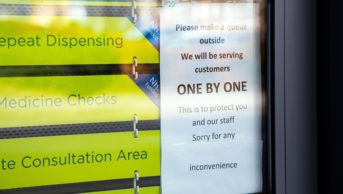
Shutterstock.com
Open access article
The Royal Pharmaceutical Society has made this article free to access in order to help healthcare professionals stay informed about an issue of national importance.
To learn more about coronavirus, please visit: https://www.rpharms.com/resources/pharmacy-guides/wuhan-novel-coronavirus

Source: Shutterstock.com
The National Volunteer Prescription Delivery Scheme helps deliver medicines to those who are shielding during the COVID-19 pandemic
More than 3,300 medicines deliveries have been scheduled since the launch of the National Volunteer Prescription Delivery Scheme in Wales, although, to date, only 2,473 deliveries have been completed, according to figures published by the Welsh government.
The National Volunteer Prescription Delivery Scheme, launched at the end of April 2020, helps deliver medicines during the COVID-19 pandemic to those who are shielding or vulnerable and socially isolated.
The scheme is available to all community pharmacies and dispensing doctors in Wales, and aims to help pharmacies and dispensing doctors with the increased demand owing to COVID-19.
On 22 June 2020, the Welsh government’s Pharmacy and Prescribing Team published figures that showed that although 3,375 deliveries had been scheduled since the scheme was launched, to date 2,473 deliveries had been completed.
The figures also showed that 116,973 shielding patients were held within the scheme’s database, with 281 volunteers participating in the scheme who were “ready and waiting” to support pharmacies with medicines deliveries.
In its communications, the team said that the “vast majority” of cases that had not been recorded as delivered were because they had been “incorrectly inputted by pharmacy users”.
This was “mainly when a pharmacy adds patients and does not follow the instructions, and has either not allocated or assigned to an individual”. As a result, volunteers may not have been notified that a delivery is waiting to be collected, which could result in delays in patients receiving their medication, the team’s communications said.
At the end of March 2020, the Welsh government announced that Disclosure and Barring Service-checked volunteers would be used to help community pharmacists deliver medicines to vulnerable patients during the COVID-19 pandemic, and a software system would be installed in every pharmacy to ensure there was an audit trail for the deliveries.
In addition, it said that the logistics software package, Pro Delivery Manager (PDM), would be installed in each community pharmacy to provide an audit trail for deliveries and help with delivery route planning and scheduling.
A spokesperson for the Welsh government said that the majority of scheduled deliveries had been successfully recorded on the PDM system as delivered, and a proportion remained ‘scheduled’. However, they said that a number had been incorrectly inputted by pharmacies, mainly as a result of additional people being added who were not shielding.
“We have provided additional advice about using the app and ensured PDM has increased its support for all community pharmacy and dispensing sites across Wales which are participating in the scheme,” they added.


